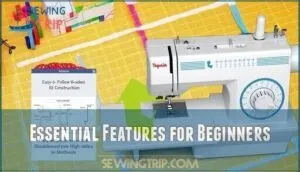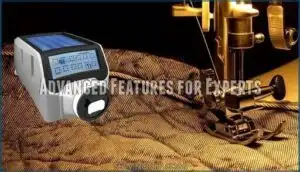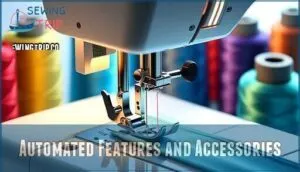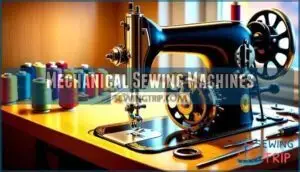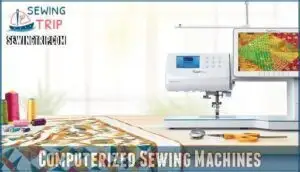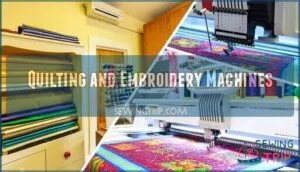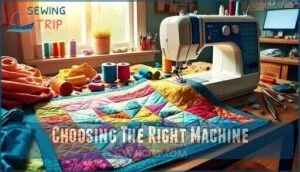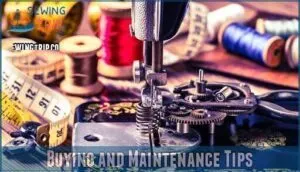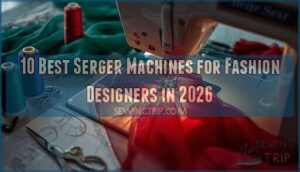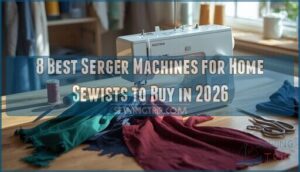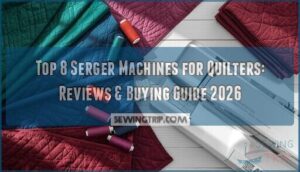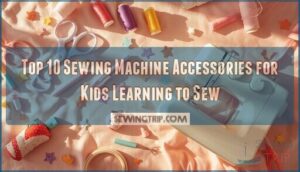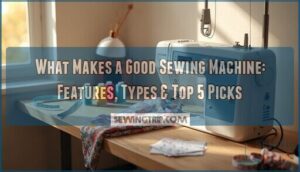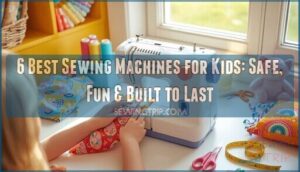This site is supported by our readers. We may earn a commission, at no cost to you, if you purchase through links.
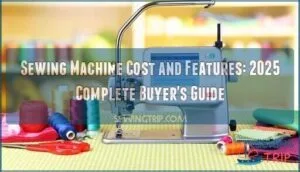
Brand reputation impacts pricing by 20-50%, with premium names like Bernina commanding higher prices despite similar functionality.
You’ll find mechanical machines offer basic straight stitches and manual controls, while computerized versions include LCD screens, automated threading, and hundreds of stitch patterns.
Build quality matters—metal frames outlast plastic ones, and established brands maintain 4.45/5 customer satisfaction ratings.
Feature complexity drives costs: beginners need easy threading and clear dials, experts require stitch regulation and programmable patterns.
The sweet spot for most sewers sits between $200-500, balancing essential features with long-term durability without breaking your budget.
Table Of Contents
Key Takeaways
- You’ll find the sweet spot between $200-$500 for most sewers, balancing essential features with durability without overspending on bells and whistles you won’t use.
- Brand reputation adds 20-50% to costs, so you can often get similar functionality from lesser-known manufacturers while premium names like Bernina command higher prices.
- Mechanical machines offer reliability and easier repairs starting around $70, while computerized models provide advanced features like LCD screens and automated threading from $150+.
- Focus on essential features first – beginners need easy threading and clear controls, while experts require stitch regulation and programmable patterns to match their skill level.
Sewing Machine Cost Factors
When you’re shopping for a sewing machine, several cost factors will determine how much you’ll spend on your new equipment.
Brand reputation, build quality, and feature complexity work together to create significant price differences between models that might look similar at first glance, influenced by the overall brand reputation.
Brand Reputation Influence
Brand reputation substantially impacts sewing machine cost, with established names commanding premium prices.
Top brands like Bernina and Janome cost 20-50% more than lesser-known competitors, yet consumers willingly pay for perceived quality and reliability.
Here’s how brand reputation influences your purchase decision:
- Consumer Trust – Established brands maintain higher customer satisfaction ratings (4.45/5 average)
- Price Justification – Premium brands leverage Swiss or Japanese engineering claims
- Market Share – Leading brands set feature standards before competitors follow
- Feature Expectations – Trusted names introduce advanced automation and specialty accessories first
Your brand choice affects long-term value through better resale prices and extensive support networks.
Some brands, like Brother sewing machines, have transformed into billion-dollar companies.
Durability and Build Quality
Material composition drives sewing machine longevity more than price alone.
Cast iron frames and hardened steel components in industrial models deliver decades of reliable performance, while plastic parts in budget machines wear faster.
Motor reliability and frame construction determine whether you’ll enjoy consistent stitch quality or face frequent repairs and component replacement.
Industrial machines, designed for heavy-duty use, are built to last.
Additional Pricing Factors
Beyond brand reputation, several factors affect your sewing machine cost and total ownership expenses.
Material costs, import tariffs, and feature complexity directly influence price ranges, while retailer markup and warranty options add to your investment.
Consider these pricing elements:
- Advanced computerized features – Touchscreens and embroidery capabilities increase costs substantially
- Heavy-duty materials – Metal frames and premium components raise manufacturing expenses
- International shipping – Import tariffs on overseas models affect final retail prices
- Extended warranty coverage – Thorough protection plans add upfront costs but reduce repair expenses
- Retailer margins – Authorized dealers often charge more than online competitors for identical models
Top 6 Sewing Machines
Now you’ll compare six standout sewing machines that offer excellent value across different price ranges and skill levels.
These models represent the best balance of features, reliability, and cost-effectiveness available in 2025.
1. Brother CS7000X Sewing Quilting Machine
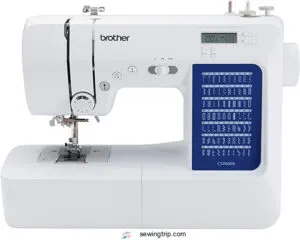
Priced around $230-260, the Brother CS7000X delivers exceptional value with 70 built-in stitches and professional-grade accessories.
Exceptional value meets professional versatility in this feature-rich machine that won’t empty your wallet
Outstanding value meets professional capability in this feature-packed machine that won’t drain your wallet.
You’ll get 10 presser feet, a wide extension table, and hard case—items that’d cost hundreds separately.
Its metal frame construction guarantees stability while the LCD display simplifies stitch selection.
The automatic needle threader and jam-resistant bobbin make setup hassle-free, whether you’re tackling quilts or hemming curtains with the help of professional-grade accessories.
Best For: Beginners and intermediate sewists who want a versatile, affordable machine for quilting, garment making, and home projects.
- Lacks an automatic thread cutter and knee lifter found on more premium models.
- Some users may find the built-in lighting insufficient for detailed work.
- Not intended for international voltage use and warranty is voided outside the US.
- 70 built-in stitches and included accessories offer outstanding value for the price.
- Durable metal frame ensures stable, reliable operation across a range of fabrics.
- Easy setup features like the automatic needle threader and drop-in bobbin simplify use for all skill levels.
2. Janome HD3000 Heavy Duty Sewing Machine
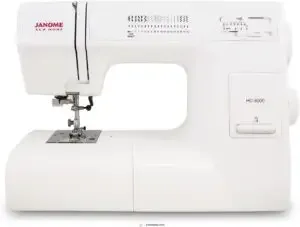
Building durable projects becomes effortless with the Janome HD3000’s aluminum die-cast frame and metal construction.
You’ll tackle thick denim, canvas, and multiple fabric layers without hesitation, thanks to its 7-piece feed dog system that grips challenging materials precisely.
The machine’s 18 built-in stitches and automatic buttonhole function handle everything from basic repairs to complex garment construction.
At $429, you’re investing in reliability that outlasts cheaper alternatives while enjoying features like built-in needle threading and jam-proof bobbin loading for seamless operation.
Best For: Sewers who want a durable, easy-to-use machine to handle general sewing, garment construction, and occasional heavy fabrics without the complexity of advanced computerized features.
- Limited quilting capabilities due to small harp space and lack of specialized feet.
- Higher price than basic entry-level machines.
- Stitch selector display lacks backlighting, making it harder to read in low light.
- Heavy-duty aluminum frame and 7-piece feed dog provide stable sewing on thick fabrics like denim and canvas.
- Simple mechanical controls and jam-proof bobbin make it beginner-friendly and reliable for daily use.
- Includes a variety of presser feet and built-in needle threader for convenient setup and versatility.
3. Bernette B33 Beginner Sewing Machine
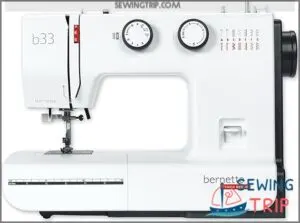
At just $199-259, the Bernette B33 delivers Swiss-engineered reliability without breaking your budget.
You’ll get 15 built-in stitches, a semi-automatic needle threader, and adjustable thread tension that handles everything from lightweight cotton to thick denim.
Its mechanical design means fewer computer glitches and easier repairs down the road.
The 2-step presser foot lift tackles multiple fabric layers, while the free arm makes sleeve alterations a breeze.
Though it’s slightly louder than computerized models, this workhorse consistently produces professional-quality stitches for basic projects and garment construction.
Best For: Beginners and hobbyists looking for a straightforward, reliable sewing machine for everyday projects and basic garment construction.
- Only works with 110V outlets, limiting international compatibility without a transformer.
- Manual four-step buttonhole is less convenient than automatic options on pricier models.
- Slightly louder during operation compared to some computerized machines.
- Simple mechanical controls ideal for new users, with 15 versatile stitches.
- Durable Swiss-engineered build with a strong metal chassis for long-term use.
- Lightweight and compact with included accessories, making setup and storage easy.
4. SINGER Quantum Stylist Sewing Quilting Machine
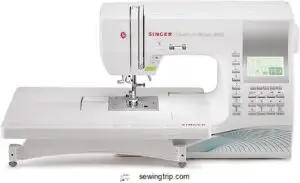
The SINGER Quantum Stylist 9960 delivers impressive versatility with 600 built-in stitches and 1,172 stitch applications.
You’ll appreciate the automatic needle threader, thread cutter, and 13 one-step buttonhole styles that streamline your workflow.
This machine handles everything from delicate silks to thick denim with its heavy-duty metal frame.
Priced around $350-$550, it includes valuable accessories like an extension table and 13 presser feet, making it excellent value for experienced sewers.
Best For: Sewists with intermediate to advanced skills seeking a feature-rich, reliable machine for quilting, garment, and home décor projects.
- Extensive stitch variety and customization options support creative sewing and quilting.
- Automatic needle threader, thread cutter, and top drop-in bobbin simplify setup and use.
- Solid metal frame ensures durability and smooth performance with various fabrics.
- Steep learning curve and overwhelming features for beginners.
- Larger, heavier build limits portability.
- Some users may find electronic controls complex to master at first.
5. SINGER 4423 Heavy Duty Sewing Machine
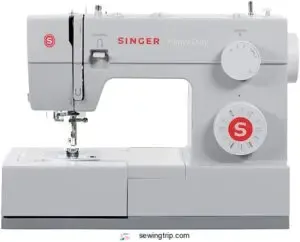
When tackling heavy-duty sewing projects, you’ll find the SINGER 4423 delivers the muscle you need.
This powerhouse features 97 stitch applications and sews at 1,100 stitches per minute, making quick work of thick fabrics like denim and canvas.
Its 60% stronger motor and heavy-duty metal frame guarantee skip-free stitching through multiple layers.
At $180-$230, it’s positioned as excellent value for money, offering professional-grade durability without breaking the bank for home sewers.
Best For: Home sewers and beginners who need a reliable, heavy-duty machine for thick fabrics and versatile projects.
- Strong motor and metal frame handle denim, canvas, and multilayer projects with ease.
- Easy setup with automatic needle threader, top drop-in bobbin, and clear manual.
- Great value with essential accessories and high stitch speed at a mid-range price.
- Foot pedal can be sensitive, making speed control tricky for some users.
- Occasional tension and needle threader issues reported with heavy or improper use.
- Limited clearance under the needle may not suit very bulky items.
6. Juki DDL-8100 Industrial Sewing Machine
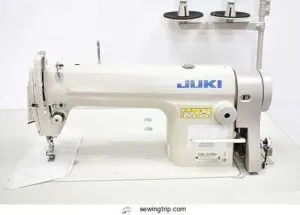
For professionals who demand unwavering performance, the Juki DDL-8100 represents industrial-grade excellence at $895-$1,050.
You’ll get blazing speeds up to 5,500 stitches per minute, handling everything from delicate silk to heavy denim with surgical precision.
This powerhouse includes a servo motor, industrial table, and LED lighting, making it a comprehensive tool for serious sewing tasks.
While assembly takes about three hours, you’re investing in a machine that’ll outlast decades of commercial use, earning it the reputation as the workhorse choice for serious sewers.
Best For: Professionals and small businesses needing a fast, reliable, and durable industrial sewing machine for high-volume garment production.
- Powerful sewing speed up to 5,500 stitches per minute for fast workflow.
- Durable build quality with servo motor for smooth and quiet operation.
- Handles a wide range of fabrics from delicate to heavy materials.
- Assembly is time-consuming and may be challenging for first-time users.
- Occasional reports of missing parts or shipping delays.
- Not a walking foot machine, limiting heavy leather or thick fabric applications.
Key Features to Consider
When shopping for your next sewing machine, you’ll encounter dozens of features that can make or break your sewing experience.
Understanding which features matter most for your skill level and projects will help you avoid paying for bells and whistles you’ll never use.
While ensuring you get the capabilities that truly count will make a significant difference in your sewing experience, it is crucial to prioritize your needs accordingly.
Essential Features for Beginners
When you’re starting out, look for a beginner sewing machine with easy threading systems that won’t leave you frustrated.
Clear stitch selection dials help you navigate options without confusion, while durable build quality guarantees your entry level machine prices deliver long-term value.
Speed control lets you work at your own pace, and included presser feet expand your capabilities, making the sewing machine a smart investment.
These essential features for beginners transform basic sewing machine cost into a valuable asset.
Advanced Features for Experts
Expert sewers need precision tools that match their skill level.
Advanced sewing machine features include stitch regulation for perfect quilting, programmable patterns for complex designs, and sensor systems that detect fabric thickness.
Professional models offer automatic tension adjustment, needle cams for decorative stitching, and premium features like multi-directional sewing.
These advanced technology components justify higher sewing machine cost but deliver unmatched control.
Automated Features and Accessories
Automated features transform tedious tasks into one-button operations.
Automatic threading eliminates squinting at needle eyes, while needle positioning stops your fabric exactly where needed.
Computerized sewing machines remember your favorite stitches through stitch memory, saving time on repeat projects.
Quality presser feet adapt to different fabrics automatically.
Advanced buttonhole creation produces professional results every time, and automatic thread cutting keeps your workspace tidy.
Many users find an automatic threading device especially helpful, utilizing automatic threading for ease.
Sewing Machine Types
Understanding different sewing machine types helps you match your budget with your actual needs.
Each type offers distinct advantages, from basic mechanical models that handle everyday mending to advanced computerized machines that tackle complex embroidery projects, providing a range of options to suit various needs.
Mechanical Sewing Machines
Mechanical machines offer the most straightforward path to sewing mastery.
You’ll find manual adjustment dials for stitch length and tension, perfect for beginner projects and basic stitching needs.
These durable models handle simple repairs with ease, making them ideal for learning fundamentals.
Basic mechanical models start around $70, delivering reliable performance without complex electronics.
Their sewing machine cost remains budget-friendly while providing essential sewing machine features you’ll actually use.
These machines often include adjustable presser feet for varied tasks, which is a key aspect of mechanical sewing machine functionality.
Computerized Sewing Machines
While mechanical machines handle basic tasks, computerized sewing machines offer advanced functionality through built-in computers and LCD screens.
These models provide automated functions like needle threaders and adjustable settings, making complex projects manageable. You’ll find computerized models starting around $150, with premium features reaching $700+.
Here’s what computerized machines bring to your sewing room:
- Wide stitch options – From basic straight stitches to intricate decorative patterns, all selectable through digital controls
- Automated functions – Features like automatic needle threading, tension adjustment, and buttonhole creation save time and reduce errors
- LCD screens – Clear displays show stitch settings, make selections easy, and guide you through complex procedures
- Adjustable settings – Precise control over stitch length, width, and speed through computerized functionality rather than manual dials
- Memory capabilities – Store your favorite stitch combinations and settings for consistent results across projects
The sewing machine computerized functionality transforms how you approach projects, offering precision that manual adjustments can’t match. Many retailers offer various machine models.
Quilting and Embroidery Machines
Quilting and embroidery machines typically expand your creative horizons with specialized workspace size and advanced stitch regulation.
You’ll find these machines excel at fabric compatibility, handling everything from delicate silks to heavy canvas with precise thread tension control.
| Machine Type | Price Range | Key Features |
|---|---|---|
| Entry-Level Embroidery | $250-$1,500 | Basic design software, compact workspace, limited embroidery capabilities |
| Mid-Range Combo | $1,099-$3,999 | Expanded workspace size, automated thread cutting, USB connectivity |
| Premium/Commercial | $7,000-$16,999 | Longarm quilting support, advanced stitch regulation, professional design software |
| Specialized Quilting | $400-$25,000 | Extended throat space, walking feet, speed control up to 1,600 SPM |
These machines offer dedicated sewing machine embroidery functions with computerized controls, touchscreen interfaces, and built-in design libraries containing hundreds of patterns for creative projects.
Consider browsing a site for a quilting embroidery machine to explore available options and find the best fit for your creative projects with advanced stitch regulation and precise thread tension control.
Choosing The Right Machine
You’ll need to match your sewing machine choice to your specific projects and skill level to get the best value for your money.
Start by identifying whether you’ll primarily mend clothes, create garments, or tackle quilting projects, then compare features against your budget to find the sweet spot between capability and cost.
Assessing Your Sewing Needs
Your project complexity determines everything.
Simple repairs need basic straight-stitch capability, while garment construction requires multiple stitch types.
Consider fabric types you’ll handle—lightweight cotton versus heavy denim demands different needle systems.
Evaluate your skill level honestly: beginners benefit from automatic features, while experienced sewers prefer manual control.
Space requirements and budget allocation shape realistic sewing goals and appropriate sewing machine purpose considerations.
When choosing, consider brands like Singer and Janome for their proven long-term reliability, which offers automatic features and manual control for a variety of needs, including garment construction.
Comparing Prices and Features
After determining your needs, smart shoppers compare sewing machine cost against actual features.
Don’t get swayed by flashy marketing—focus on what you’ll actually use.
Brand comparison reveals surprising value differences, while user reviews expose real-world performance issues that specs won’t tell you.
Smart comparison strategies that save money:
- Test identical features across brands – A $200 Brother might match a $400 competitor’s basic stitching quality
- Read user reviews for long-term durability – Discover which "budget-friendly" machines break after six months
- Calculate cost-per-feature ratios – That expensive machine’s 500 stitches mean nothing if you’ll use only 10
- Check price ranges during sales seasons – Timing your purchase can slash 30-40% off retail prices
- Consider refurbished professional models – Get premium features at mid-range pricing with proper warranties
Feature prioritization beats feature counting every time.
Budget sewing success comes from matching machine capabilities to your actual projects, not buying the most impressive spec sheet.
Warranty and Support Considerations
Beyond price comparisons, warranty coverage protects your investment.
Extended warranties vary substantially across brands, with some offering thorough repair network access while others provide basic online support.
| Brand Type | Warranty Length | Support Features |
|---|---|---|
| Premium | 25+ years | Authorized repair network, phone support |
| Mid-range | 2-5 years | Online tutorials, community forums |
| Budget | 1-2 years | User manuals, email support |
Consider maintenance and repair costs when choosing. Brands with strong sewing machine repair networks reduce long-term expenses compared to models requiring specialized technicians.
Buying and Maintenance Tips
Making the right buying decisions and maintaining your sewing machine properly will protect your investment for years to come.
Understanding where to shop, what maintenance costs to expect, and which additional features truly matter can save you both money and frustration down the road, by helping you make informed decisions about your investment.
Where to Buy for Beginners
Shopping for your first beginner sewing machine doesn’t have to break the bank.
Online retailers like Amazon offer competitive sewing machine prices and customer reviews. Local dealers provide hands-on testing and expert guidance for affordable sewing machine selection.
Used machines from classified ads deliver excellent value, while rental programs let you try before buying.
Many sewing classes include machine access, perfect for exploring different models before committing to purchase, and finding the right fit with expert guidance.
Maintenance and Repair Costs
Once you’ve bought your machine, understanding sewing machine maintenance and repair costs helps you budget smartly.
Annual servicing averages $89-$149, while common repairs like motor replacement cost $85-$200.
Here’s your cost breakdown:
- Maintenance Schedules: Professional annual service reduces breakdowns by 55% and extends machine lifespan 3-7 years
- Repair Estimates: Diagnostic fees run $18-$35, with labor rates 15-40% higher in urban areas
- Warranty Options: Service plans during purchase cut annual maintenance costs by 22%
Regular maintenance involves checking for machine oil levels to guarantee smooth operation.
Added Features and Accessories
Your sewing machine’s added features and accessories can transform your crafting experience from basic to brilliant.
These extras determine your machine’s specialized capabilities and expand what you can create.
Regular maintenance is key, so be sure to follow basic sewing machine tips.
- Presser Feet: Zipper, buttonhole, and blind hem feet tackle specific tasks
- Bobbin Systems: Drop-in systems offer easier threading than front-loading styles
- Extension Tables: Provide extra workspace for quilting and large projects
- Needle Threaders: Automatic threading saves time and reduces eye strain
Frequently Asked Questions (FAQs)
Does a sewing machine comparison chart make money?
Comparison charts compare features, compare prices, and compare value—but they don’t directly generate revenue themselves.
You’d need affiliate links, sponsored content, or ads to monetize your sewing machine comparison work effectively, and this is where the actual revenue generation comes from, through sponsored content.
How much does a sewing machine cost?
You’ll find sewing machines range from $150 for basic mechanical models to over $20,000 for professional-grade machines, with most home sewers spending $300-$1,200 for computerized models with advanced features.
How do I choose a good sewing machine?
Like finding the perfect thread for your fabric, choosing a sewing machine requires matching your needs with the right features.
Consider your skill level, project types, and budget—beginners need basic mechanical models, while advanced sewers benefit from computerized options.
What are sewing machine reviews?
Sewing machine reviews evaluate specific models through hands-on testing of stitching quality, ease of use, and features.
You’ll find expert assessments covering setup, stitch performance on various fabrics, and included accessories to guide your purchasing decision.
Are Brother Sewing machines more budget-friendly?
Yes, Brother sewing machines are typically more budget-friendly than premium brands like Bernina or Juki.
You’ll find reliable Brother models starting around $150-$300, offering user-friendly features and advanced technology without breaking the bank.
How much does a sewing machine cost on average?
Congratulations on joining the "I need a machine but my wallet’s already crying" club!
You’ll spend around $450 on average for a computerized model, though basic machines start at $150 and high-end models reach $5,000+.
What’s the best sewing machine for the money?
For the best value, you’ll want a mid-range computerized machine around $300- Brother and Singer models in this range offer automatic features, multiple stitches, and reliability without breaking the bank.
How much did the sewing machine cost?
Like walking through a maze of price tags, sewing machine costs vary wildly from budget-friendly $150 basics to professional $5,000+ models, with most quality machines landing between $300-$1,200 depending on features.
How much do sewing machines cost?
Sewing machines range from $50 for basic mechanical models to over $15,000 for professional-grade machines. You’ll find computerized options starting around $150, while high-end embroidery machines can cost $5,000+.
How much does a Singer sewing machine cost?
Looking for a Singer that won’t break the bank? You’ll find Singer sewing machines ranging from $150 to $500, with basic mechanical models starting around $150 and premium computerized versions reaching $
Conclusion
Exploring sewing machine cost and features resembles choosing the right compass for your journey—you need reliable direction without unnecessary complications.
Your investment should match your creative destination, whether you’re starting with basic alterations or tackling complex quilting projects.
Remember that the most expensive machine isn’t always the best fit for your needs.
Focus on essential features first, then consider advanced options as your skills develop.
Smart shopping means balancing sewing machine cost and features with your actual usage patterns, ensuring years of productive stitching ahead, and allowing for smart shopping decisions.
- https://sewingmachineshop.com/sewing-machine-reviews/
- https://mypacklove.com/blog/label/top-7-best-sewing-machines-for-beginners-in-2025-expert-picks/
- https://www.qualitysewing.com/blogs/news/best-sewing-machines-2025
- https://www.thebusinessresearchcompany.com/report/sewing-machine-global-market-report
- https://sewcanshe.com/7-best-sewing-machines-for-a-beginner/

